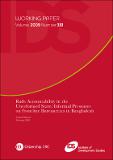Rude accountability in the unreformed state : informal pressures on frontline bureaucrats in Bangladesh
Abstract
‘Rude’ forms of accountability are central to how poor people negotiate their
entitlements on the frontline of service delivery in Bangladesh. This paper
documents the unorganised, informal pressures that poor citizens exert on
officials in a context where effective formal systems for accountability are absent,
and the state remains unreformed in key respects. The paper explores the impact
of ‘rude accountability’ on services, as well as their limitations and the
consequences for formal accountability systems. Based on extensive research
into how poor people experience safety nets, schools and health services, the
paper argues that strong social and local political pressures go some way towards
supplying a rough responsiveness to demands for service. These work through
shame and embarrassment, pressures to maintain reputation and status, and the
threat of violence. Poor people have good reasons to use these methods in
preference to formal accountability mechanisms. And poor women may have a
particularly strong comparative advantage in doing so – not because they are so
much better than men or rich people at complaining and shaming, but because it
is comparatively less difficult for them to do so than to engage in more formally
structured means of complaint or feedback. The idea of rude accountability is
seductive: when formal governance systems fail, the idea that there are informal
mechanisms that are better suited to context and culture is intrinsically attractive.
Yet the paper concludes that the gains from rude accountability are often
short-lived and may backfire, as public officials fear and resist efforts to enable
citizen participation in holding them to account. There are features of
contemporary Bangladeshi state-society relations that lend themselves to informal
means of accountability, the analysis here of informal accountability mechanisms
has wider implications for the move towards citizen involvement in performance-based
accountability in other contexts.
Keywords: accountability, Bangladesh, bureaucracy, education, gender,
governance, health, social protection, politics, poverty.

